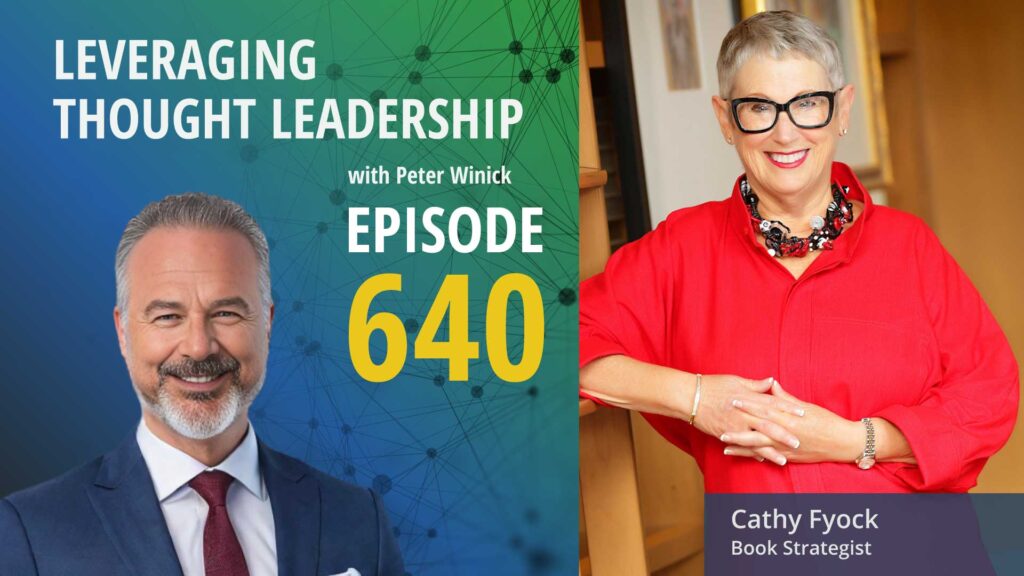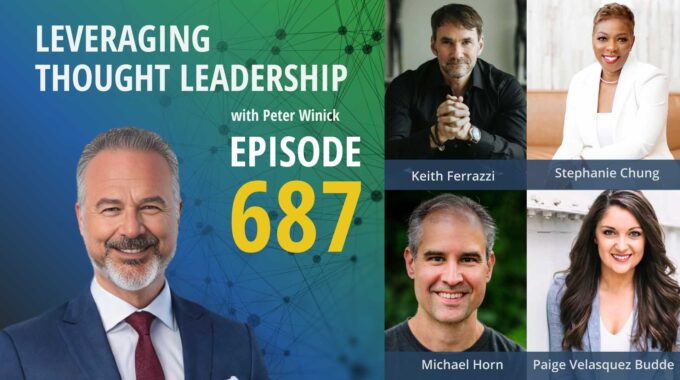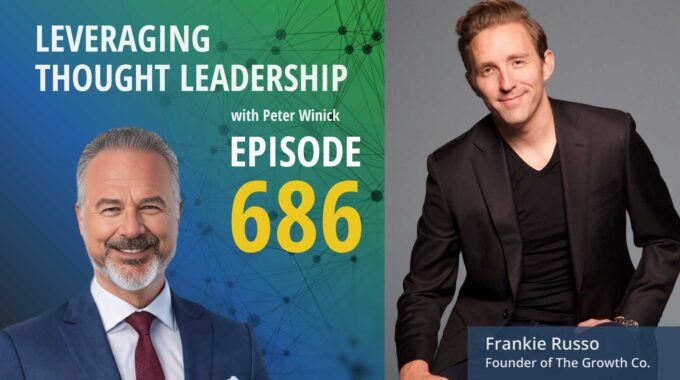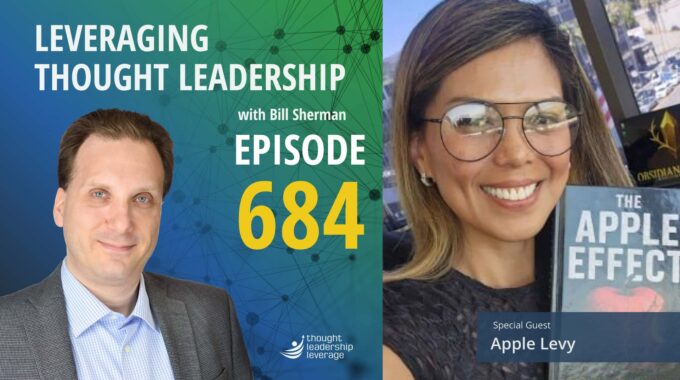Four practical frameworks to sharpen your message, market, and metrics This Best of 2025 compilation…
Crafting Books that Grow Your Brand and Business | Cathy Fyock

Why Every Thought Leader Needs a Plan Before They Publish
Writing a book isn’t just about putting words on a page—it’s about aligning your message with your business goals. This episode explores how a strategic approach to authorship can help thought leaders clarify their audience, amplify their brand, and drive real results. From choosing the right publishing path to leveraging a book as a sales tool, we uncover what it takes to turn a manuscript into meaningful impact.
What’s the real reason you want to write a book?
If your answer doesn’t connect directly to your business goals, you may be missing the mark. In this episode of Leveraging Thought Leadership, Peter sits down with Cathy Fyock, a book strategist who helps authors write the right book—the one that aligns with their business, audience, and long-term strategy.
Cathy shares why writing a book should never be step one. Instead, authors must start with a solid strategy: What do you want the book to do for your business? Who exactly are you writing it for? How will you leverage it to create opportunity, revenue, or credibility?
We explore the importance of aligning your book’s content and audience with your current business model. Cathy also explains why writing for “everyone” is a mistake, and why serving a clearly defined niche can lead to powerful results—even if it feels narrow.
If you’ve ever wrestled with the choice between self-publishing, hybrid, or traditional publishing, Cathy breaks down the pros and cons of each. Her recommendation? Own your IP, own your margins, and stay in control.
You’ll also hear surprising insights about how some authors make more from not selling books—using them as a powerful sales tool to land clients, speaking gigs, and consulting contracts.
Three Key Takeaways
Start with strategy, not writing. A successful book begins with clear goals, a defined audience, and alignment with your business model—not just a blank page and good intentions.
Niche focus drives greater impact. Writing for a well-defined, specific audience builds credibility and creates stronger results than trying to appeal to everyone.
Books are business tools, not just products. The real ROI often comes not from book sales, but from using the book to generate leads, secure speaking engagements, or land high-value clients.
If you found value in the strategic insights shared in this episode, you won’t want to miss our conversation with Becky Robinson: “Writing a Book as an Extension of Your Business.” Becky, the founder and CEO of Weaving Influence, delves into how authors can seamlessly integrate their books into their broader business strategies. She shares practical advice on launching a book, building a lasting platform, and ensuring your message reaches the right audience over time. This episode is a must-listen for anyone looking to amplify their thought leadership and make their book a cornerstone of their business growth.
Transcript
Peter Winick And welcome, welcome, Welcome. This is Peter Winick. I’m the founder and CEO at thought leadership leverage. And you’re joining us on the podcast today, which is leveraging thought leadership. Today, my guest is Cathy Fyock. She is a book author and strategist, and she has a whole process of methodology on how to sort of help people get the book they want to write and need to write out of them in a smart way. So. Instead of my attempting to describe it, let’s just get into it. So welcome aboard, Cathy. How are you? Thank you so much, Peter. It’s great to be here. So what is a book strategist, right? Because I think that a lot of people that are in the process or thinking about writing a book, it becomes overwhelming, right. There’s who’s goes to write. There’s ghost writers. Like, what is it that you do? And maybe what is that you don’t do?
Cathy Fyock So somebody once said, well, if I need to write a book, do I just start writing? I’m like, no, no that will get you a book. But I’m not sure that will, get you, a book that will grow your thought leadership, your business, your credibility, your visibility, it may be fun. It may be interesting, but it may not be the right book. So I think it’s really important to start with a strategic plan. For what you want your book to do. How do you want it to interface with your business? Do you want to just establish your thought leadership more broadly? Do you it to be a high-priced calling card? Do you want the curriculum that you use for training clients or classroom training? So thinking strategically about what the book should be I think is the most important thing as you begin to write a book to grow your business.
Peter Winick Well, and I think that, I think you’re a hundred percent right. And then I think the strategy for the book needs to sort of fall under the strategy, for the business, because oftentimes I think what happened. Really, really smart people undergo the, or get involved in the book process and they treat it as a whole different thing and it becomes the tail that wags the dog and it’s like, okay, if you’re writing the book to elevate your brand or show the market that you’re smart or attract new clients. How does that align with your current business strategy? Right. Because it should align with that. It shouldn’t be this totally.
Cathy Fyock Absolutely, it should just go hand in glove. And if it doesn’t, something’s out of whack. You know, your book is out of whack or your strategy is out a whack. Something isn’t quite properly aligned.
Peter Winick Yeah. And then I think I would imagine this is part of your process is to sort of temper or manage expectations around what is possible and what is not and, and all those sorts of things, because as difficult as it is to write a book and it is difficult, try Marcy selling it and getting something besides your, your brother law to buy it.
Cathy Fyock Yes, yes, so yes, and it should not be incongruent with your business marketing plan. It should, again, be highly congruent with that. And in many cases, it’s just thinking about what do you need to tweak or what do need to add. For example, you don’t need a whole new website for your book. I think you do need a landing page, but a landing, a landing can be part of your website that now includes your book. So it doesn’t have to be this completely separate and different thing, it just needs to be meshed with what you’re doing for your business.
Peter Winick So if I were considering writing a book or thinking about it or whatever, what are some advice you might give me or suggestions you might have?
Cathy Fyock Okay, if we were working together, we would schedule a strategy session. It’s generally a two hour meeting where we define very clearly the purpose of your book and how it integrates with your business, how it interfaces with what you’re already doing, what you want to do. It should, we should identify the thesis statement, what the book is about, what it isn’t about, who the reader is and who the reader isn’t. And then what is the structural outline? And then from that, we develop a project plan for writing the book, including some checkpoints for the deliverables that we will look for along the way. And then basically I meet with the author on a weekly basis, check in and so forth.
Peter Winick So I want to double click, if you will, on the, who the book is for, because I see this all the time and I’m curious as to keep your experience in little things, because I’ll say to folks, okay, well, who is this piece of thought leadership, who has this book, who are you serving? And you know, there’s two answers to that question. One is a smart one, meaning really, really thoughtful, psychographically, demographically. I’m, you know I’m looking for that high potential leader in a high growth company that is experiencing. Technological change and you might go, wow, that’s a metal. But then you think about it and you go, God, I know exactly who you’re looking for. The other answer is, Oh, everybody I’ve yet to see, uh, you know, a business book. There are other books we could argue, whatever, where it really is applicable to everybody. And I think that the danger of trying to please everybody is you watered it down so much that it means nothing. So how would you either push back on that or violently agree?
Cathy Fyock No, I, I heartily agree that, uh, and your targeted reader should be absolutely aligned with your targeted client so that you’re not reinventing the wheel, you’re not going off in some incongruent direction. You are, you know, you, you building this thing so that it all works together.
Peter Winick And I think there’s a, um, whether it’s a fear or, or, or a scarcity mindset, wherever the case may be, when you put these constraints on authors, some of them, you know, kind of freak out a little bit. Oh my God. If it’s only this little small group, you know, oh, my, my market’s small. And it’s like, I find it’s the opposite that the more constraint you put on it, it’s actually more freeing because it’s easier to go, is that really relevant to people that look like that, that, that, and it’s Yes, no, or maybe, bang, bang bang. If you’re trying to, again, please too many people, it’s impossible. It’s impossible
Cathy Fyock Yeah, one of my authors, and he brought me the numbers when we were working together, but he was writing a book for chamber leaders, chamber of commerce leaders. And he was an executive director. He’d been on several, heading up several organizations. He wrote this book for Chamber of Commerce leaders, potentially also their boards, but primarily the leader. And you know what? That’s a pretty big group because he knew the actual numbers. And while you think, oh gosh, you know, chamber of commerce is, we’re talking about leaders in a very, very, uh, a niche market, we are, but he became sort of like the go-to guy in that niche market. And that’s really what you want. You want to be the go to expert within your niche market
Peter Winick Yeah, no, I love that. And, and I think there’s comfort in knowing that like your first reaction to your chamber of commerce examples. Well, I only know one. Well, of course you do. You only live in one town. And of course, you knew one. And like, then you’re like, okay, does every major city have a chamber? Every small city. Yep. Oh, maybe it’s kind of like florists. Maybe there’s what I thought might have been a handful. Maybe there’re thousands or a 10,000 of them, whatever. Why would I ever think about. Who’s the, leads the chamber of commerce in Topeka, Kansas. Unless I lived in Topeka, Kansas, so it also validates that there is a market that is big enough for what you do and how you do it and all those sort of things.
Peter Winick If you’re enjoying this episode of Leveraging Thought Leadership, please make sure to subscribe. If you’d like to help spread the word about our podcast, please leave a five-star review at ratethispodcast.com forward slash LTL and share it with your friends. We’re available on Apple podcasts and on all major listening apps, as well as at thoughtleadershipleverage.com, forward slash podcast. Thoughts?
Peter Winick That you would care to share relative to the how. And what I mean by that is once we figure it out sort of who we’re writing for and you’ve got your methodology and process to write more effectively, now there’s a whole other set of questions I have to wrestle with as a potential author of, do I self-publish, do I do hybrid, do I go traditional? And it’s like, ah, this is all overwhelming. I thought I just sit at the typewriter with a glass of wine and it’ll all just flow out of me. It’s like not quite.
Cathy Fyock Yeah. No, not really. Yo, those are some big decisions. I just talked with an author. She’s wanting to write a book to grow her business. And she thought, of course, to go the path of traditional publishing was where she would want to go. I said, I don’t know here. There’s some, there’s some pros and cons. So we talked about it. And for many of my clients who are writing a book for business growth, to grow their brand, their platform. It doesn’t make sense, in many cases, to go with a major publisher. You own your IP when you self-publish or hybrid publish, and I think that’s the option I like to see my authors deal with. You own you IP, you can buy your books at cost, you can mark up your books and you receive the best margin. You have total creative control. You can speed to market, you can get it to market faster. I mean, they’re just. Any number of reasons that you should, I think, own your intellectual property as a thought leader and entrepreneur.
Peter Winick Yeah. And I think a lot of it is people just don’t know that there are options. I mean, most people think, Oh, I have to go to a publisher because I don’t know, I buy books and there’s a publishing logo on it and blah, blah, blah, but there’s, you know, some of the things that you mentioned control time to market cost risk quality. There are more and more options today available for all ever before, which is a good thing, but it also means you have an obligation to. Educate yourself as to what are the right ones or you today? Yeah
Cathy Fyock A lot of authors also think, oh, well, if I go with a publisher, they’re going to market the book for me. I want to laugh then. It’s like, no, not so much. You’re going market your book pretty much however you go about doing it. And you have the most to gain or lose when you’re doing it yourself. I think you do a better job when you are self-publishing or hybrid publishing your book. And, and then you have a lot more options for if you want to later put out a training video on your content or a training class or an online class, you may or may not have that capability with the contract that you signed with a traditional publisher. With the hybrid publishers I work with, you totally own that and have total control with other rights for other forms and formats for that content.
Peter Winick Yeah. And I think that’s, that’s another thing that people don’t realize is wait a minute, it’s not just the book, right? There’s lots of other derivatives and variables and you know, who controls the IP and what you can do with it and all that other stuff, you know? And, and he says from a sales and marketing standpoint, regardless of the path that you go. You are solely or the vast majority of the responsibility of the sales, the marketing, the success of the book is on you and there, or if you’re going to put in all that effort to sell the book, shouldn’t you reap your fair share of the profits, right? Cause a typical publishing deal is, you know, that’d give you 15, 20 cents on the dollar. That’s not the definition of a partner I’m used to.
Cathy Fyock No, no, most of my authors do far better by going the hybrid route and assuming more of the risk of their book. But then if you assume the risk, you’re going to work really hard to make sure it’s going to take off and do what it’s intended to do.
Peter Winick No, I think that’s right, because you the risk and the reward have to be hand in hand. Anything that you’re seeing now, because I also think that to some degree, you know, it’s like the gold rush that and what I mean by that is you wonder if the only people making money with books or the you know the people selling the pickaxes like they did during the gold So there are a lot of, and you start to discover this once you start to go down the path of. You know, book launch experts and PR experts, and we’ll get you on this list and you can be an Amazon best seller. So can you give us a little sense of sort of what is realistic and what is, let’s call it maybe less valuable in terms of the investment that you’re making relative to the promise?
Cathy Fyock Well, I think if you’re counting on book sales as a huge revenue stream, you’re going to be disappointed. I think, if you are looking at your book as a way to generate higher speaking fees, larger consulting fees, broader access, you know, some of those kinds of things, that’s where you make your money. So it’s not necessarily on the book sale itself. And the study that you had shared with me, the ROI study was amazing in that it confirmed that. Basically, authors who are making money on their books not on sales, it’s really on how you can leverage that book to grow other parts of your business. I’ll tell you one, I know a one story, for example, one of my authors never even sold a book but made hundreds of thousands of dollars on their book because They had a very high, high value consulting service that they provided. The book was their proposal, if you will, and they gifted the book to high value prospects. And when those converted, then reaping hundreds of thousands of dollars in rewards. And that’s the key.
Peter Winick Well, and I think that’s an interesting brings up an interesting point where, you know, it goes back to what we said earlier, defining who the reader is. And I think one way with clients to get there, say, okay, give me the names of 20 people that meet that criteria, 20 people you could name by name. Right. You know, if it’s, it’s head of innovation at a fortune 1000 company. Do you know 20 people? That have that title or is that something you made up? Let’s go to LinkedIn. Let’s find them. And then here to your point. Selling a book is a lovely thing, but the reality is if your goal is to, the purpose of the book is to get in the hand of someone that could go, aha, here’s a check for hundreds of thousands of dollars to be my consultant, my advisor, my fill in the blank, why would you possibly let the barrier of 15 or 20 or 25 bucks stand in the way of that? Wouldn’t you want to get it in, into the hands of the people? That could that could engage that level. Now, if you’re if your engagements are nominal, the math doesn’t work. But you have to write a little bit of math here and say, would I invest in giving out 200 books in the hopes of landing two clients and one hundred thousand dollars each? Yeah, that seems like a logical bet.
Cathy Fyock Yes, yes. And I know some folks with their speaking isn’t worth hundreds of thousands, but it’s worth five to $10,000. And you know, you gift, one of my clients gifted 50 books and got five full fee speaking engagements. Well, that was a really smart investment. And again, they didn’t have to sell any books at all. They gifted them to, and these were not random people, strangers. These were people that were within their circle, and he wrote a lovely note, you know, to each one with a little card showing how he might provide additional services in that space. And it was an absolute moneymaker.
Peter Winick Fantastic. Well, this has been great. I appreciate all the, uh, experience and the knowledge that you’re sharing with us today. It’s a, it’s great stuff. I appreciate you, Cathy. Thank you so much.
Cathy Fyock Thank you, Peter.
Peter Winick To learn more about Thought Leadership Leverage, please visit our website at ThoughtLeadershipLeverage.com. To reach me directly, feel free to email me at peter at Thought Leadership leverage.com and please subscribe to Leveraging Thought Leadership on iTunes or your favorite podcast app to get your weekly episode automatically.





